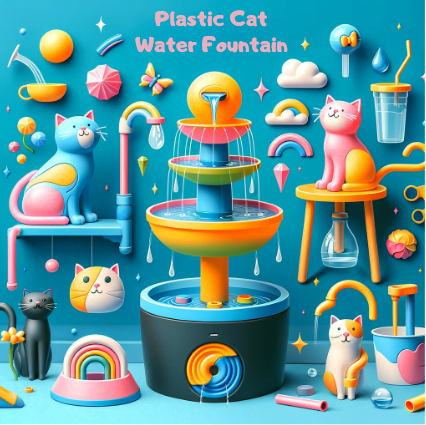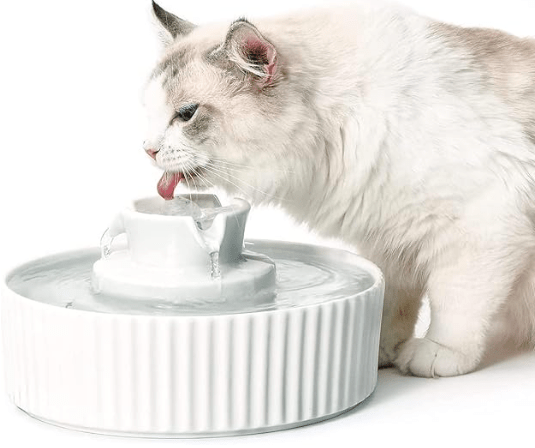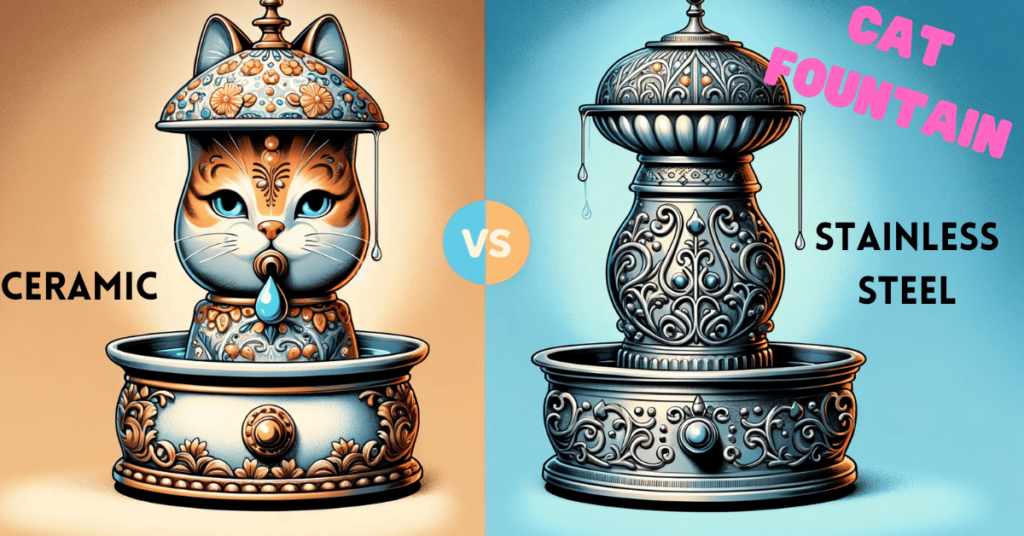This post contains affiliate links and I will be compensated if you make a purchase after clicking on my links.
Diving Into the Debate: Stainless Steel vs. Plastic Cat Water Fountains
In the realm of cat water fountains, a debate bubbles up: Stainless Steel vs Plastic cat fountains.
Which one reigns supreme in the quest for the perfect sip? Will the sleek and robust stainless steel take the trophy, or does the versatile and colorful plastic have a trick up its sleeve?
Get ready to dive deep into this pool of knowledge. We’re not just scratching the surface; we’re exploring every nook and cranny to help you decide the best watering hole for your whiskered companion.
Stainless Steel vs Plastic Fountains Quick Comparison
Choosing the right cat fountain can be perplexing for tech-savvy cat lovers. To give you a clear picture, here’s a comparison chart detailing the differences in stainless steel vs plastic cat fountains across various aspects.
| Aspect | Stainless Steel | Plastic |
|---|---|---|
| Hygiene and Health Impact | Non-porous, resistant to bacteria | Prone to scratches |
| Durability | Robust, long-lasting, resists wear and tear | Less durable, may require replacements |
| Maintenance & Ease of Cleaning | Easy to clean, dishwasher safe, resists staining and odors | Needs regular thorough cleaning |
| Cost and Value | Higher initial cost, better long-term value | Budget-friendly upfront, higher long-term cost |
| Eco-Friendliness | Durable, recyclable, less waste over time | Higher environmental impact, but some use recycled materials |
| Cat Preference and Behavior Response | Preferred for its coolness | Visually appealing |
| Fountain Options | Best Stainless Steel Fountains>> | Best Plastic Fountains>> |
Why Material Matters in Cat Fountains

Let’s explore why the material of a cat fountain is a key consideration for any cat parent.
1. Hygiene, Health, and Safety
The material of the fountain plays a big role in how bacteria-friendly it is. For our sensitive or allergy-prone feline friends, choosing a material that doesn’t give bacteria a foothold is key.
2. Durability and Maintenance
A sturdy fountain means less hassle for you and consistent, fresh water for your cat. Plus, who doesn’t love a low-maintenance pet accessory?
3. Aesthetics and Appeal
Let’s face it, if it doesn’t appeal to your cat, they won’t use it. The right material can make all the difference in turning a water fountain into your cat’s new favorite watering hole.
4. Environmental Impact
Choosing products with a minimal ecological footprint supports a healthier planet. It’s about finding options that are not only safe and suitable for our pets but also contribute to the sustainability of our environment.
The Stainless Steel Cat Fountain

Stainless steel cat fountains are like the sleek, modern gadgets of the cat hydration world. They bring a touch of sophistication to your cat’s daily routine while ticking all the boxes for health and hygiene.
Characteristics of Stainless Steel Cat Fountains
Picture this: a shiny, smooth surface that’s the epitome of modern kitchen appliances, but for your cat. Stainless steel fountains are known for their sturdy build and contemporary look. They’re often designed with sleek lines and minimalistic features, making them a stylish addition to any room.
Advantages of Stainless Steel Cat Fountains
- Durability: Like the best kitchen gadgets, these fountains are built to last. Stainless steel can handle a bit of cat-titude, from playful swats to the occasional knock-over.
- Hygiene: Easy to clean and resistant to bacteria, they’re a dream for the health-conscious pet parent. No nooks and crannies for germs to hide in here!
- Aesthetics: They’ve got the kind of look that says, “Yes, I love my cat and I have great taste.” It’s a win for both style and function.
Disadvantages of Stainless Steel Cat Fountains
- Cost: Quality comes at a price. These fountains can be a bit more of an investment compared to other materials.
- Weight: They’re not exactly portable. Once you’ve found the perfect spot, you’ll probably want to leave it there.
- Noise: Depending on the design, the sound of water against steel might be louder than in other fountains, which could be a consideration for more timid cats or quiet homes.
Example of Top-Rated Stainless Steel Cat water Fountain

Featuring a whopping 3.2L capacity for up to 8 days of water, silent operation for peaceful nights, and a multi-stage filtration system for the cleanest sips around, AONBOY’s fountain is a hydration station that caters to both your pet’s health and your peace of mind.
The Plastic Cat Fountain

Plastic cat fountains are like the versatile, colorful gadgets in the world of cat hydration. They offer a playful twist to your cat’s drinking experience, blending practicality with a dash of fun.
Characteristics of Plastic Fountains
Imagine a kaleidoscope of shapes and colors – that’s what plastic cat fountains bring to the table. They’re known for their lightweight design and wide array of styles. From whimsical flower designs to sleek, modern curves, there’s a plastic fountain to match every cat personality and home decor.
Advantages of Plastic Fountains
- Lightweight: Easy to move and handle, these fountains are perfect for the cat owner who likes to switch things up or clean frequently.
- Cost-Effective: If you’re dipping your paws into the world of cat fountains for the first time, plastic options are a wallet-friendly way to start.
- Variety of Designs: Whether your taste is more classic or playful, there’s a plastic fountain to suit your (and your cat’s) style.
- Colorful and Fun: They often come in fun, engaging designs that can be more appealing to some cats, encouraging them to drink more.
Disadvantages of Plastic Fountains
- Durability Concerns: While they’re kind on your wallet, plastic fountains might not stand the test of time like their stainless steel counterparts.
- Potential Health Risks: Scratches and wear can make cleaning more challenging and potentially harbor bacteria, so regular maintenance is key.
- Less Stable: Their lighter weight can also mean they’re more likely to be knocked over by enthusiastic or playful cats.
Example of Top-Rated Plastic Cat Water Fountain

Low on noise and high on efficiency, the Catit Flower Fountain whispers hydration into your cat’s day without whispering a word to your electricity bill, costing less than 2p per day to run. Compatible with triple action filters for continuous purity, and designed with a handy viewing window for easy water level checks.
Comparative Analysis: Stainless Steel vs Plastic Cat Fountains
When comparing stainless steel vs plastic cat fountains, several key factors come into play that can influence your decision. Let’s break it down and compare these two popular materials in key aspects:
Hygiene and Health Impact
- Stainless Steel: These fountains are a powerhouse in hygiene. Their smooth, non-porous surface makes it difficult for bacteria to cling and multiply. Ideal for cats with sensitive skin or allergies.
- Plastic: While they offer variety in design, plastic fountains can be prone to scratches where bacteria can accumulate. This requires vigilant cleaning, especially for cats with health sensitivities.
Durability and Longevity
- Stainless Steel: Known for their robustness, stainless steel fountains can endure the test of time and cat play. They resist wear and tear, making them a long-term investment.
- Plastic: These are lighter and might not withstand the enthusiastic antics of some cats as well as stainless steel. They may show wear sooner and require replacement more frequently.
Maintenance and Ease of Cleaning
- Stainless Steel: Easy to clean and often dishwasher safe, stainless steel makes maintenance a breeze. Its resistance to staining and odor retention is a big plus.
- Plastic: Regular and thorough cleaning is more crucial here due to the potential for scratches and cracks. While they’re usually easy to disassemble and clean, the maintenance needs to be more frequent.
For detailed steps on keeping your cat’s water fountain sparkling clean, check out our comprehensive guide on how to clean a cat water fountain.
Cost and Value Analysis
- Stainless Steel: Initially, these fountains might feel like a pinch on the wallet, but their longevity and low maintenance needs offer great value over time. You’re investing in a fountain that’s likely to stay with you and your cat for years.
- Plastic: They’re the budget-friendly option upfront. However, considering potential replacements due to wear and tear, the long-term cost might tally up. It’s a balance between immediate savings and future spending.
For instance, in our post on the best cat fountains, the top-featured stainless steel fountain starts at approximately $38, while the best plastic option begins at $23.
Eco-Friendliness
- Stainless Steel: Durable and recyclable, stainless steel has a respectable eco-profile. Its longevity means less waste over time, a solid point for environmentally conscious cat owners.
- Plastic: While convenient, plastic’s environmental impact is higher, especially with the need for more frequent replacements. However, some brands do offer recycled materials, which is a step in the right direction.
Cat Preference and Behavior Response
- Stainless Steel: Some cats prefer the coolness of stainless steel, and its typically quieter operation can be a boon for more timid felines.
- Plastic: The variety of designs can be more visually appealing to cats. However, the lighter weight can make these fountains less stable, potentially deterring more playful or skittish cats.
Another Great Material to Consider: Ceramic

While we’ve navigated through the world of stainless steel and plastic cat fountains, let’s not overlook a charming contender: ceramic.
Ceramic fountains are a hygiene hero, boasting a non-porous surface that’s resistant to bacteria – a major plus for our allergy-prone furry friends. These fountains are tough cookies, resistant to scratches and less likely to be toppled over by playful paws. Speaking of looks, they’re quite the eye-catcher, adding a touch of elegance to any room.
And here’s a cool fact: ceramic keeps water naturally cooler, a feature that might just tempt your kitty to drink more. Plus, they’re kind to the planet, made from natural materials and boasting a smaller environmental paw-print compared to their plastic pals.
Example of Top-Rated Ceramic Cat Water Fountain

Cleaning the Cepheus 360 is effortless, thanks to its easy-to-disassemble parts designed for thorough and hassle-free maintenance. Its multi-directional streams not only add oxygen to the water, encouraging your pets to drink more but also ensure a healthier hydration experience.
Final Verdict: Why Stainless Steel Cat Fountains Outshine Plastic
After weighing the merits of stainless steel versus plastic cat fountains, we’ve found that while both have their benefits, stainless steel fountains take the lead for the discerning cat owner.
Stainless steel stands out for its unparalleled hygiene, unmatched durability, and straightforward maintenance, positioning it as the practical and steadfast option for providing your cat with clean, safe water. Despite plastic fountains being easier on the wallet and available in diverse designs, their long-term value and practicality just can’t quite match up to the lasting advantages of stainless steel


